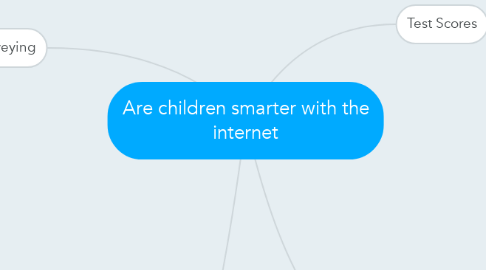Are children smarter with the internet
by hannah thacker

1. International
1.1. In fact, in countries that reported the most technology use in the classroom, such as Spain, Sweden and Australia, students' reading performance actually declined between 2000 and 2012.
1.2. Conversely, in these Asian countries where less than half the students reported using computers at school, the children were among the top performers in reading and computer-based mathematics tests, according to OECD's assessment program.
2. Surveying
2.1. According to a new survey of 1,021 technology experts and critics, hyperconnectivity is a mixed bag
2.2. Fifty-five percent of those surveyed agreed that the Internet has wired the under-35 crowd differently, and that this rewiring is a good thing, stimulating multitasking talent and an ability to find relevant information fast online.
2.3. Most of the respondents also said the Internet would improve reading and writing by 2020, according to the study, conducted by the Imagining the Internet Center at Elon University in North Carolina and the Pew Internet and American Life project.
2.4. A study led by researchers at the University of Coventry in Britain surveyed a group of 8- to 12-year-olds about their texting habits, then asked them to write a sample text in the lab. The scientists found that kids who sent three or more text messages a day had significantly lower scores on literacy tests than children who sent none.
2.5. An online survey of 895 Web users and experts found more than three-quarters believe the Internet will make people smarter in the next 10 years, according to results released on Friday.
2.6. While almost three quarters of pupils in the countries surveyed used computers at schools, the report by the the Organization for Economic Cooperation and Development found technology had made no noticeable improvement in results. summary- This article says that the internet doesn’t improve testing scores. Even saying that kids who use the internet score less then kids who don’t.
2.7. One of the centre's studies, using an iPod Touch, found that the vocabulary of 13 five-year-olds improved by an average of 27% after using an educational app called Martha Speaks.
2.8. "The correct answer is a combination of the two," wrote MIT professor David Clark. "I think in the 'device' space we can see much of what will happen over the next few years: the ubiquitous availability of sensors and actuators, the cyber-car, various sorts of implants and proto-cyborg elements.
2.9. according to a study by internet security software giant,AVG by the time children reach the age of 2 90% of them have an online history.
3. Test Scores
3.1. They found that children who used the Internet more had higher scores on standardized reading tests after six months, and higher grade point averages one year and 16 months after the start of the study than did children who used it less.
3.2. "Three out of four experts said our use of the Internet enhances and augments human intelligence, and two-thirds said use of the Internet has improved reading, writing, and rendering of knowledge," said Janna Anderson, study co-author and director of the Imagining the Internet Center, in a statement.
3.3. Computers do not noticeably improve school pupils' academic results and can even hamper performance, an OECD report said Tuesday that looked at the impact of technology in classrooms across the globe.
4. Internet Usage
4.1. By the time they’re 5 half of them have already used a tablet or internet connected device and by the time they reach 7 or 8 many of them are already playing video games.
4.2. The Kaiser Foundation reports that children actually spend on average 8 hours and 40 minutes per day on technology.
4.3. When people expect to have future access to information, Sparrow wrote, “they have lower rates of recall of the information itself and enhanced recall instead for where to access it.” summary- Says wether or not all of the technology we have access to today is making us smarter. The article says it helps you find things easier.
4.4. As a child psychiatrist, I hear well-meaning parents feeling bad about their digital choices for their children, whether it be, for example, providing their 9-year-old boy with a smartphone, or allowing their 11-year-old daughter to join Instagram.
4.5. in the US most young children have access to a touch-screen device and, according to Daniel Anderson, a professor emeritus of psychology at the University of Massachusetts, using these devices could be more addictive than watching television.
4.6. For most children and teenagers, using the Internet has joined watching television and talking on the phone in the repertoire of typical behavior
4.7. in fact, 87 percent of 12- to 17-year-olds are now online, according to a 2005 Pew Research Center report in fact, 87 percent of 12- to 17-year-olds are now online, according to a 2005 Pew Research Center report


